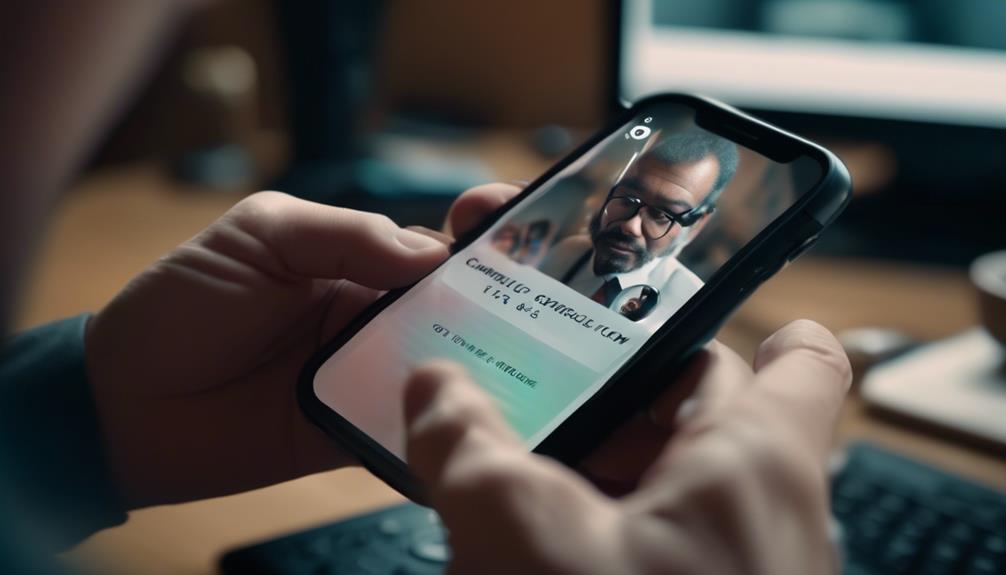Numerous individuals have fallen prey to fake charity call scams, losing money to fraudulent organizations. With these scams on the rise, it’s crucial to have strategies to decline such solicitations. By adopting simple tactics, one can significantly reduce the risk of falling victim to these schemes. From scrutinizing high-pressure tactics to being cautious with donation methods, there are numerous ways to safeguard against fake charity call scams. Nevertheless, one critical tactic can make all the difference in protecting oneself from these deceitful ploys.
Research the Charity

When researching a charity, use reputable charity rater websites like Charity Navigator or CharityWatch. These help evaluate legitimacy and effectiveness. Ensure contributions go to a legitimate organization by conducting thorough research. Verify nonprofit status through the IRS Tax Exempt Organization Search. Understand that nonprofit status alone doesn’t guarantee legitimacy. Gather comprehensive information by conducting online searches using key terms related to the charity’s name, mission, and reviews from multiple sources. Contact local organizations claimed to be associated with the charity to confirm their affiliation and legitimacy. Be cautious of charities that pressure for immediate donations. Avoid nontraditional payment methods like cryptocurrency, wire transfers, or gift cards. By taking these steps, ensure contribution to a legitimate and impactful charity. Foster a sense of belonging within a cause believed in.
Verify Nonprofit Status
Prior to donating, individuals should verify the official registration and tax-exempt status of a nonprofit organization. This will ensure the charity’s legitimacy and the proper use of donations. By confirming the nonprofit status, donors can be confident that their contributions will have a meaningful impact.
Check Official Registration
To verify a charity’s legitimacy, use official channels like the IRS Tax Exempt Organization Search Tool or a reputable watchdog website. Check the charity’s name on a watchdog website to confirm its authenticity. Be cautious of nontraditional payment methods; opt for credit cards or checks for safety. Research the charity’s mission statement, track record, and impact for transparency. Beware of links on social media or unsolicited emails and avoid high-pressure sales tactics. Vigilantly verify the official registration of charities to avoid falling victim to fake charity scams.
Verify Tax-Exempt Status
Once the charity’s registration is confirmed, individuals should use the IRS Tax Exempt Organization Search Tool to verify its nonprofit status. This step ensures the organization is a legitimate charity and has the claimed tax-exempt status. By utilizing official channels like the IRS tool, donors can avoid falling victim to scammers who falsely claim tax-exempt status. Moreover, individuals can consult resources from reputable organizations like the Federal Trade Commission and BBB Wise Giving Alliance to further validate a charity’s legitimacy. Verifying the tax-exempt status is crucial for donors to ensure their contributions go towards impactful causes.
Scrutinize the Charity’s Name

In evaluating a charity’s name, verify its registration and look for an official website. This can confirm the organization’s legitimacy and ensure donations support a reputable cause. Additionally, comparing the name to well-known charities can provide insights into authenticity.
Verify Charity Registration
When verifying a charity, it’s vital to check its registration on a watchdog website. This ensures authenticity and legitimacy against potential scams. Verify contact details on the watchdog site, and beware of fake charities mimicking reputable ones. Request proof of nonprofit status and verify it using the IRS Tax Exempt Organization Search Tool. These precautions safeguard against identity theft and fraudulent schemes.
Check for Official Website
When verifying a charity’s name, ensure the web address and contact details are accurate by cross-referencing with watchdog websites. To avoid falling for fake charity scams, be vigilant and follow these tips: Verify the web address and contact details for legitimacy. Cross-reference with watchdog websites to confirm authenticity. Compare the charity’s name with well-known organizations to spot any differences. Be cautious of fake charities with names similar to reputable organizations.
Watch for High-Pressure Tactics
Beware of charity fundraisers using high-pressure tactics to push for immediate donations. Fake charities often use urgency and aggressive language to manipulate you. Legitimate charities welcome inquiries and donations at any time. If you encounter high-pressure tactics, step back and gather more information. Scammers rely on urgency to manipulate people into giving money quickly. Watch for these tactics and take time to verify the charity’s legitimacy to protect yourself.
Avoid Nontraditional Payment Methods

When donating to charities, using secure payment methods is crucial to avoid potential scams. It’s best to steer clear of nontraditional payment methods like cryptocurrency, gift cards, wire transfers, and payment apps. These methods are often untraceable and hard to dispute. Instead, opt for safer and more traceable payment methods such as credit cards or checks for added protection.
Use Secure Payment Methods
When donating to charities, it’s crucial to use secure payment methods like credit cards or checks. These methods help minimize unauthorized charges and safeguard personal information. Credit cards offer fraud protection and the option to dispute unauthorized charges. Debit cards can provide similar protections, but monitoring transactions closely is essential. Checks leave a paper trail and can be traced if needed. Additionally, consider using reputable and secure online payment platforms with buyer protection and encryption.
Beware of Wire Transfers
Consider avoiding nontraditional payment methods like wire transfers when donating to charities, as they are often irreversible and untraceable. Scammers may pressure donors to use wire transfers, making it difficult to recover funds if the charity is fake. Legitimate organizations typically accept more secure options like credit cards or checks. Always verify the charity’s name, contact information, and legitimacy before providing financial information. Be cautious of warning signs, such as a reluctance to provide detailed information about the charity’s mission, programs, and finances. By avoiding wire transfers and nontraditional payment methods, donors can protect themselves from falling victim to fake charity call scams.
Stick to Credit Cards
For greater protection against scams, it’s advisable to use credit cards for donations. Avoid wire transfers, gift cards, and cryptocurrency. Credit cards offer added security and easier dispute resolution. Nontraditional methods may be untraceable or hard to refund. When donating, ensure the charity, like the American Cancer Society, is legitimate. Avoid sharing personal information over the phone or social media. Stick to credit cards to contribute securely to genuine charities and avoid falling for fake charity call scams.
Guard Personal Information

To safeguard personal information, exercise caution when sharing sensitive data like bank account numbers or social security numbers. When contacted by a charity, verify their legitimacy by using a search engine to find their phone number. Then, contact them directly to confirm their identity. Be cautious of unsolicited calls requesting personal information, as legitimate charities typically do not ask for sensitive financial details over the phone. If someone claiming to be from a charity asks for your Social Security number or bank account information, refrain from providing it. Protecting personal information is crucial to guard against potential charity scams. By being vigilant and verifying the charity’s identity before sharing any personal data, individuals can reduce the risk of falling victim to fraudulent schemes. Remember, genuine charities prioritize the security of donors’ personal information and will not pressure individuals into divulging sensitive details over the phone.
Be Cautious With Emails
When receiving emails from charitable organizations, exercise caution and refrain from clicking on links or attachments. This is because bad actors often use email as a tool to perpetrate charity scams. Therefore, it’s crucial to be vigilant and protect oneself. Here are some tips to avoid falling victim to sham charities through email: First, never donate in response to unsolicited emails. It’s best to ensure that the charity is legitimate and aligns with personal values before making any contributions. Second, verify the charity’s legitimacy by researching and confirming that the charity is registered and reputable before considering any donations. Third, be wary of urgent donation requests, as emails that pressure for immediate contributions may be a red flag for potential scams. Authentic charitable organizations typically allow donors to contribute at their own pace. Finally, avoid opening email attachments to prevent the risk of viruses and malware. It’s advisable to delete emails from charities containing attachments.
Look for Warning Signs

As individuals evaluate charitable organizations, they should watch for warning signs indicating potential scams. Donating directly to well-known charities is preferable. Inquiring about the percentage of the donation going directly to the cause is important. It’s also advisable to check with the Internal Revenue Service or use resources like Charity Navigator to assess credibility. Caution is advised with charities pressuring for immediate donations or using high-pressure sales tactics. Payment methods like wire transfers, cash, or gift cards are often linked to charity scams. Suspicious thank-you emails from unfamiliar charities should raise red flags. Exercise caution with emails from charitable organizations. Awareness of these warning signs and proactive verification can help avoid falling victim to fake charity call scams.
Donate Directly
For ensuring funds reach charity, donate directly. This prevents scams and maximizes impact. Direct donations reduce fraud risk.
Stay Alert

Staying vigilant is crucial to spot and avoid charity scams. Recognize scammers’ tactics and decline immediate donation requests. Stay cautious, avoid feeling pressured, and verify charities through reputable sources. Stick with established organizations and use secure payment methods. Regularly monitor accounts to detect potential scams early. Stay informed and protect yourself from falling victim to fraudulent schemes.
Frequently Asked Questions
How Do I Stop a fake Charity Call?
To prevent unwanted charity calls, you can block numbers or use call screening. Additionally, report scams and verify charities. If necessary, consider legal recourse to protect against fraudulent solicitations.
How Do I Stop Charity Scams?
In order to prevent charity scams, individuals must raise awareness and practice phone call etiquette. Additionally, they should implement fraud prevention strategies and verify donations. It is important to be vigilant and proactive in protecting oneself from fraudulent activities by employing scam detection techniques.
What Are 4 to 5 Ways Scamming Can Be Prevented?
In order to prevent scamming, individuals should practice phone etiquette and increase scam awareness. They should also conduct donation research, screen calls, and implement fraud prevention measures. These steps empower people to protect themselves and contribute to a safer community.
How Do I Decline a Charity Request?
When declining a charity request, it’s crucial to assert boundaries and recognize scams. Politely decline with confidence and clarity, ensuring respect for your decision.
Conclusion
To sum up, in the case of fake charity call scams, it’s crucial to stay alert and conduct thorough research on charities. By avoiding pressure tactics, individuals can safeguard themselves from scams. It’s important to donate wisely and be mindful of warning signs to ensure contributions go to legitimate causes.



